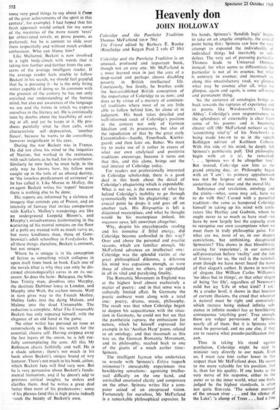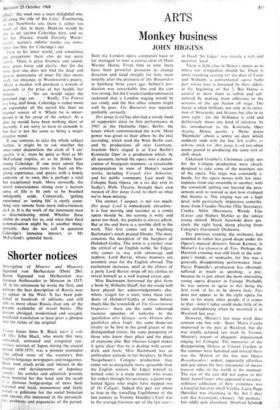Heavenly don
JOHN HOLLOWAY
Coleridge and the Pantheist Tradition Thomas McFarland (ouP 70s) The Friend edited by Barbara E. Rooke (Routledge and Kegan Paul 2 vols £7 10s) Coleridge and the Pantheist Tradition is an unusual, profound and important book, though not an easy one. Mr McFarland is a most learned man in just the area of a deep-seated and perhaps almost disabling poverty in British intellectual life. Courteously, but firmly, he brushes aside the best-established British conception of the importance of Coleridge to us now; and does so by virtue of a mastery of continen- tal traditions where most of us are little able to follow behind him, let alone sit in judgment. His book takes detailed and well-informed stock of Coleridge's position in the context not only of German Idealism and its precursors, but also of the repudiation of that by the great early Existentialists—Jacobi, Feuerbach, Kierke- gaard; and then later on, Buber. We must try to make use of it rather in excess of what our own analytical and positivist traditions encourage, because it turns out that this, and this alone, brings out the real interest of Coleridge today.
For readers not professionally interested in Coleridge scholarship, there is a good deal in this book about the detail of Coleridge's plagiarising which is expendable. What is not so, is the essence of what lay behind Coleridge's inability to go through systematically with his plagiarising: at the crucial point he drops it and goes off on another tack. His Biographia is left a disjointed masterpiece, and what he thought would be his masterpiece indeed, his magnum opus, left unwritten altogether.
Why, despite his encyclopaedic reading and his immense if fitful energy, did Coleridge become embroiled in this way? Over and above the personal and psychic reasons, which are familiar enough, Mr McFarland advances an intellectual one: Coleridge was the splendid victim of the great philosophical dilemma, a dilemma his mind was capacious enough, as were those of almost no others, to apprehend in all its vital and paralysing finality.
The Romantic Movement in England was at the highest level almost exclusively a matter of poetry : and in that sense was a culturally limited affair. In Germany the poetic outburst went along with a total one: poetry, drama, music, philosophy. The result was that when Coleridge began to deepen his acquaintance with the situa- tion in Germany, he could not but see that the pantheistic rapture, the enthusiasm for nature, which he himself expressed for example in his 'Aeolian Harp' poem, related to an ontology; and that inasmuch as this was so, the German Romantic Movement, and its philosophy, reached back to one of the giants of a much earlier time: Spinoza.
The intelligent layman who undertakes to wrestle with Spinoza's Ethics (superb misnomer!) inescapably experiences two bewildering sensations: agonising intellec- tual difficulty on the one hand, and unrivalled emotional clarity and composure on the other. Spinoza writes like a com- puter seized of an enraptured vision. Fortunately for ourselves, Mr McFarland is a remarkable philosophical expositor. In his hands, Spinoza's 'fiendish logic' begins to take on an angelic simplicity, the crucial point being this: Spinoza saw how the very attempt to expound the individuality of individual things led inevitably to self- defeat. The very act of pursuing particular Thisness leads to Universal Oneness instead; for what seems to differentiate the particular is not of its essence, but what is contrary to essence; and inasmuch as. along this unsatisfactory road, we glimpse what may be essence after all, what %se glimpse, again and again, is some self-same and permanent thing.
So, the austerest of ontologies brines us back towards the raptures of experience and to poems like Wordsworth's `Tintern Abbey'. Coleridge's own responsiveness to the splendours of externality is clear from some of his poems; and is becoming clearer still (Mr McFarland notices) as the 'astonishing vital.ty' of his Notebooks is being made known to us in the superb Bollingen edition of Kathleen Coburn. With this side of his mind, he deeply felt Spinoza's pantheistic pull. 'Did philosophy begin with an it is', he remarked, . . Spinoza wo •-d be altogether true'. But instead, Coler;dge saw him as the grand enticing decc..'er. Philosophy began with an 'I am': its primary apprehension was not the largesse of nature, but the austerities of the inner and the moral life.
Substance and revelation, ontology and the trinity—what, some may ask, have we to do with this? Cursed with a parochial tradition—the same as hampered Coleridge himself in taking up his mind with tenth- raters like Hartley and Godwin, whom he ought never to so much as have read—we have by now largely lost the capacity even to recognise our own assumptions when we meet them in truly philosophic guise. For what are we, most of us, sin our deepest convictions, but unthinking, decapitated Spinozists? This shows in that bloodthirsty craving for 'experience', in our constant self-prostration before 'reality' and the tide of history: for us, the real is the rational, even though we have never heard the name of that slogan's author. It shows in worship of slogans like William Carlos Williams's `no ideas but in things', or that other slogan of being 'for life', regardless of Newman's mild but icy 'Life of what kind? I ask'. At a cruder level, it shows in that hoariest of current illusions, the creed that whatever is natural must be right and conversely; which (nature being indeed infinite sub- stance in infinite modes) has as bewildering consequence 'anything goes'. True enough, these are vulgar perversions of Spinoza, nearly all of them. But it is Spinoza who must be perverted, and no one else, if they are to receive what pseudo-justification they can.
Thus in taking his stand against pantheism, Coleridge might be said to minister very directly to our needs. Even so, I must rate him rather lower in this respect than Mr McFarland does. He seems to me more valuable for his position, that is, than for his quality. If one looks at the very nerve of his response, either to the outer or to the inner world, what one finds, judged by the highest standards, is often not quite first-rate. 'The solemn murmur of the unseen river . . . and the silence of the Lake'; 'a clump of Trees. . . had a fine
effect': 'the road was a most delightful one. all along the side of the Lake'. Fascinating as the Notebooks are, there is rather too much of this in them. Hopkins would be one to set against Coleridge here, and so, for her Diaries. would Dorothy Words- worth: nature's infinite modes are some- times too fine for Coleridge's net.
Turn to his inner world, and sometimes the perceptions there also do not quite satisf■. There is great firmness and sound- ness. great force and clarity; but for the most part one does not find the deep and diverse spontaneity of inner life that shows itself, for instance, in Wordsworth's poetry. 'Many a maiden will purchase a wreath of diamonds at the price of her health, her honour . . .'; 'the sot would reject the poisoned cup, yet. . . .9 Really, The Friend is a long, dull book. Coleridge is rather more an expounder of the moral life than an original source of it. Where he is unsur- passed is in his grasp of the subject. As a don, he would have been nothing short of heavenly. I am sorry to have to concede it, but that is not the same as being a major creative mind.
If one ventures to take the whole subject further, it might be to ask whether the inner-outer disjunction, the clash of 'I am' against 'it is', must be quite as final as Mr McFarland implies, or as he thinks ham- strung Coleridge. If one must admit that morality sometimes turns its back on life- giving experience, and speaks with a lonely authority of its own, this is perhaps a vital but exceptional truth. More normally, the moral consciousness strung over a narrow sense of life is fit only to be brushed indulgently aside. Conversely, 'getting experience' or 'seeing life' is surely some- thing very remote from mere indiscriminate suck in. It is the work of the innermost man as discriminating mind. Whether these cliches do much for us, and what their final systematisation might be, is another thing; certainly, they do not call in question Coleridge's immense interest, or Mr McFarland's splendid book.



















































 Previous page
Previous page